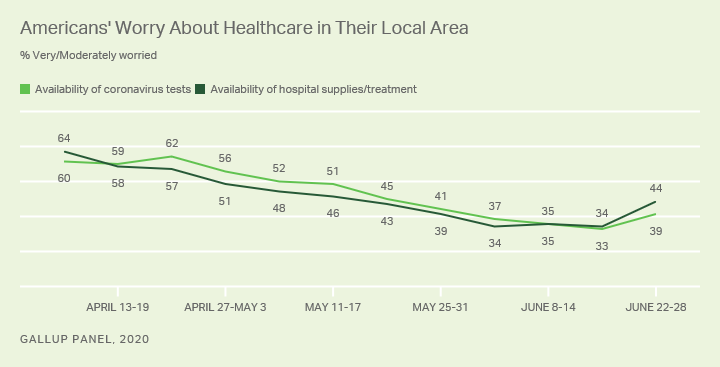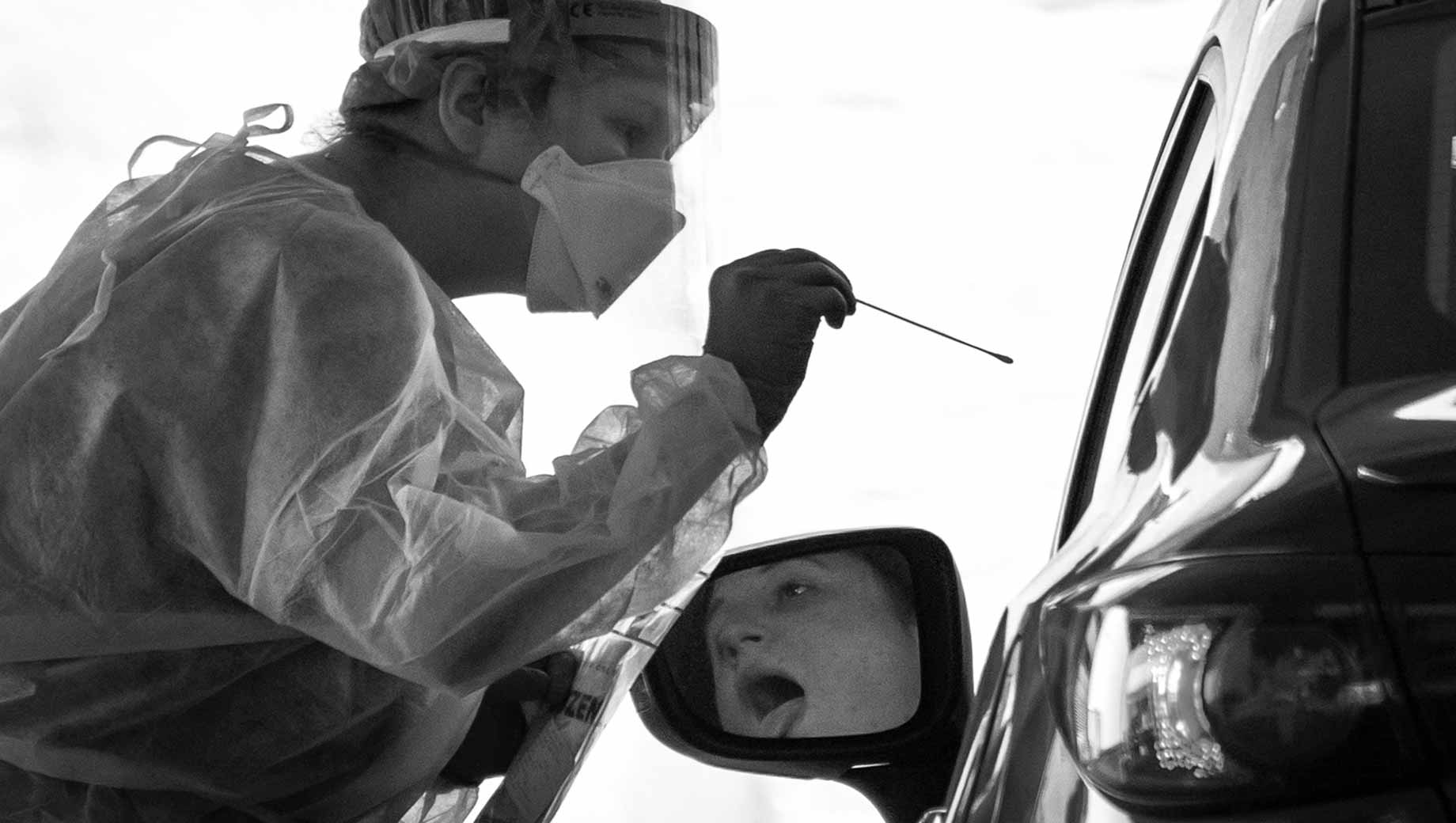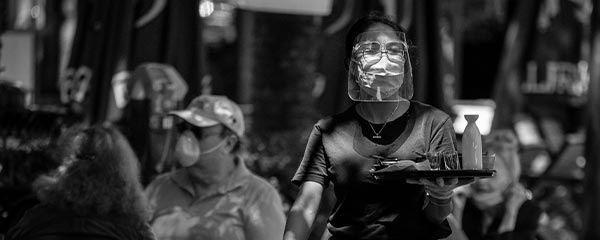Story Highlights
- Concern is up again as 39% worry about testing, 44% about hospital resources
- Younger Americans and Democrats continue to express most worry
- Gaps in worry continue across party identification lines
WASHINGTON, D.C. -- Americans' concerns about the availability of coronavirus tests and hospital supplies and services had leveled off in June after steady declines from mid-April through early May. But last week, June 22-28, as COVID-19 cases are spiking across much of the country, concern about both healthcare issues increased.
Forty-four percent of Americans are now very or moderately worried about the availability of hospital supplies, services and treatment in their local area, up 10 points from the prior week. At the same time, concern about the availability of coronavirus tests in their local area is up six points to 39%.

Line graph. Weekly results from April 13 through June 28 in the percentage of Americans very or moderately worried about two aspects of COVID-19-related healthcare in their local area.
Worry about the availability of hospital supplies and treatment fell from 64% in April to 34% in the week ending June 21 but has risen to 44% in the week ending June 28. Worry about the availability of coronavirus tests has also increased, to 39%, after falling from 60% in April to 33% in mid-June.
Public concern about both issues was much higher in April but started to decline in early May and continued to drop until early June.
Strong Age and Party Gaps Persist in Concern About Testing
Despite monthly changes in the overall level of Americans' who are worried about coronavirus testing in their local area, Democrats, younger Americans and women have consistently worried more about this than their counterparts.
Nonwhites were significantly more concerned about this than whites in May tracking, but the gap has narrowed since then.
| April 6-12 | May 4-10 | June 15-21 | June 22-28 | |||||||||||||||||||||||||||||||||||||||||||||||||||||||||||||||||||||||||||||||||||||||||||||||||
|---|---|---|---|---|---|---|---|---|---|---|---|---|---|---|---|---|---|---|---|---|---|---|---|---|---|---|---|---|---|---|---|---|---|---|---|---|---|---|---|---|---|---|---|---|---|---|---|---|---|---|---|---|---|---|---|---|---|---|---|---|---|---|---|---|---|---|---|---|---|---|---|---|---|---|---|---|---|---|---|---|---|---|---|---|---|---|---|---|---|---|---|---|---|---|---|---|---|---|---|---|
| % | % | % | % | |||||||||||||||||||||||||||||||||||||||||||||||||||||||||||||||||||||||||||||||||||||||||||||||||
| Gender | ||||||||||||||||||||||||||||||||||||||||||||||||||||||||||||||||||||||||||||||||||||||||||||||||||||
| Men | 55 | 49 | 29 | 33 | ||||||||||||||||||||||||||||||||||||||||||||||||||||||||||||||||||||||||||||||||||||||||||||||||
| Women | 66 | 56 | 37 | 44 | ||||||||||||||||||||||||||||||||||||||||||||||||||||||||||||||||||||||||||||||||||||||||||||||||
| Age | ||||||||||||||||||||||||||||||||||||||||||||||||||||||||||||||||||||||||||||||||||||||||||||||||||||
| 18-29 | 74 | 63 | 50 | 48 | ||||||||||||||||||||||||||||||||||||||||||||||||||||||||||||||||||||||||||||||||||||||||||||||||
| 30-49 | 65 | 58 | 36 | 40 | ||||||||||||||||||||||||||||||||||||||||||||||||||||||||||||||||||||||||||||||||||||||||||||||||
| 50-64 | 49 | 42 | 23 | 36 | ||||||||||||||||||||||||||||||||||||||||||||||||||||||||||||||||||||||||||||||||||||||||||||||||
| 65+ | 59 | 50 | 33 | 34 | ||||||||||||||||||||||||||||||||||||||||||||||||||||||||||||||||||||||||||||||||||||||||||||||||
| Race | ||||||||||||||||||||||||||||||||||||||||||||||||||||||||||||||||||||||||||||||||||||||||||||||||||||
| White | 59 | 48 | 32 | 37 | ||||||||||||||||||||||||||||||||||||||||||||||||||||||||||||||||||||||||||||||||||||||||||||||||
| Nonwhite | 66 | 64 | 35 | 42 | ||||||||||||||||||||||||||||||||||||||||||||||||||||||||||||||||||||||||||||||||||||||||||||||||
| Party identification | ||||||||||||||||||||||||||||||||||||||||||||||||||||||||||||||||||||||||||||||||||||||||||||||||||||
| Democrats | 84 | 78 | 51 | 56 | ||||||||||||||||||||||||||||||||||||||||||||||||||||||||||||||||||||||||||||||||||||||||||||||||
| Independents | 60 | 52 | 33 | 37 | ||||||||||||||||||||||||||||||||||||||||||||||||||||||||||||||||||||||||||||||||||||||||||||||||
| Republicans | 30 | 22 | 12 | 12 | ||||||||||||||||||||||||||||||||||||||||||||||||||||||||||||||||||||||||||||||||||||||||||||||||
| Gallup Panel, 2020 | ||||||||||||||||||||||||||||||||||||||||||||||||||||||||||||||||||||||||||||||||||||||||||||||||||||
Democrats Lead Worry About Hospital Care
The biggest gap in worry about hospital supplies, services and treatments locally continues to be seen by party, with 63% of Democrats versus 16% of Republicans now very or moderately worried.
Smaller gaps in concern about hospital care persist by gender and age, with women and adults under 50 more concerned. However, the gap between whites and nonwhites has now shrunk to less than 10 points, while the overall worry for each group increased in the past week after declining since mid-April.
| April 6-12 | May 4-10 | June 15-21 | June 22-28 | |||||||||||||||||||||||||||||||||||||||||||||||||||||||||||||||||||||||||||||||||||||||||||||||||
|---|---|---|---|---|---|---|---|---|---|---|---|---|---|---|---|---|---|---|---|---|---|---|---|---|---|---|---|---|---|---|---|---|---|---|---|---|---|---|---|---|---|---|---|---|---|---|---|---|---|---|---|---|---|---|---|---|---|---|---|---|---|---|---|---|---|---|---|---|---|---|---|---|---|---|---|---|---|---|---|---|---|---|---|---|---|---|---|---|---|---|---|---|---|---|---|---|---|---|---|---|
| % | % | % | % | |||||||||||||||||||||||||||||||||||||||||||||||||||||||||||||||||||||||||||||||||||||||||||||||||
| Gender | ||||||||||||||||||||||||||||||||||||||||||||||||||||||||||||||||||||||||||||||||||||||||||||||||||||
| Men | 57 | 43 | 29 | 38 | ||||||||||||||||||||||||||||||||||||||||||||||||||||||||||||||||||||||||||||||||||||||||||||||||
| Women | 70 | 52 | 39 | 49 | ||||||||||||||||||||||||||||||||||||||||||||||||||||||||||||||||||||||||||||||||||||||||||||||||
| Age | ||||||||||||||||||||||||||||||||||||||||||||||||||||||||||||||||||||||||||||||||||||||||||||||||||||
| 18-29 | 83 | 68 | 47 | 59 | ||||||||||||||||||||||||||||||||||||||||||||||||||||||||||||||||||||||||||||||||||||||||||||||||
| 30-49 | 71 | 52 | 41 | 50 | ||||||||||||||||||||||||||||||||||||||||||||||||||||||||||||||||||||||||||||||||||||||||||||||||
| 50-64 | 54 | 38 | 24 | 38 | ||||||||||||||||||||||||||||||||||||||||||||||||||||||||||||||||||||||||||||||||||||||||||||||||
| 65+ | 54 | 42 | 29 | 35 | ||||||||||||||||||||||||||||||||||||||||||||||||||||||||||||||||||||||||||||||||||||||||||||||||
| Race | ||||||||||||||||||||||||||||||||||||||||||||||||||||||||||||||||||||||||||||||||||||||||||||||||||||
| White | 60 | 45 | 31 | 43 | ||||||||||||||||||||||||||||||||||||||||||||||||||||||||||||||||||||||||||||||||||||||||||||||||
| Nonwhite | 72 | 56 | 45 | 49 | ||||||||||||||||||||||||||||||||||||||||||||||||||||||||||||||||||||||||||||||||||||||||||||||||
| Party identification | ||||||||||||||||||||||||||||||||||||||||||||||||||||||||||||||||||||||||||||||||||||||||||||||||||||
| Democrat | 84 | 70 | 53 | 63 | ||||||||||||||||||||||||||||||||||||||||||||||||||||||||||||||||||||||||||||||||||||||||||||||||
| Independent | 65 | 50 | 35 | 44 | ||||||||||||||||||||||||||||||||||||||||||||||||||||||||||||||||||||||||||||||||||||||||||||||||
| Republican | 37 | 19 | 14 | 16 | ||||||||||||||||||||||||||||||||||||||||||||||||||||||||||||||||||||||||||||||||||||||||||||||||
| Gallup Panel, 2020 | ||||||||||||||||||||||||||||||||||||||||||||||||||||||||||||||||||||||||||||||||||||||||||||||||||||
Implications
With news that the coronavirus continues to spread, and as the U.S. hits a record number of new cases, worry about two key aspects of medical care -- hospital treatment and testing -- is increasing again after stabilizing briefly at relative low points in mid-June. This is likely a result of Americans feeling the effects of a virus on a curve that is increasing.
Throughout the pandemic, younger people have expressed more concern about healthcare capacity than older Americans, and that continues to be the case now. This age pattern seems to run contrary to information shared by the Center for Disease Control (CDC), which reports that seniors are the age group at highest risk for severe illness from this disease, along with people who live in a long-term care facility or who have underlying medical conditions.
It is not clear why those who are less likely to become severely ill may worry more about the availability of hospital supplies and treatment. Previous Gallup analysis about this issue suggests political orientation is a strong factor in determining virus-related attitudes and behavior, and it is a likely factor here.
Learn more about how the Gallup Panel works.




